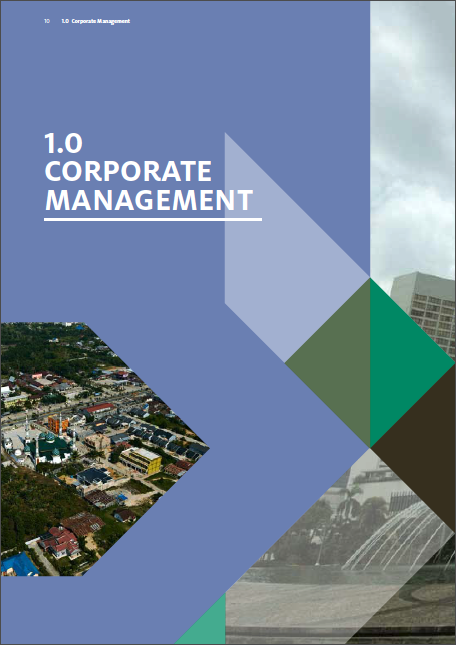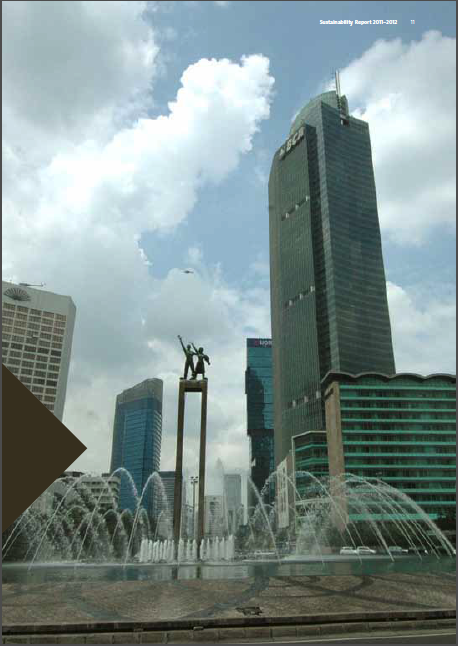APRIL has clear and well-developed corporate governance.
The affairs of APRIL Indonesia are overseen by a Supervisory Board comprising, at 31 December 2012, six members: Bey Soo Khiang (Chairman), A.J. Devanesan (President and Chief Operating Officer), Praveen Singhavi (Chief Financial Officer and Deputy Business Head), Ibrahim Hasan (President Commissioner, Indonesia), Kusnan Rahmin (President Director APRIL Indonesia) and Imelda Tanoto.
The Chairman is an Executive Chairman.
Two of the Board Members are nonexecutive. None of the Board Members are independent.
The Supervisory Board of APRIL Indonesia is committed to ensuring that high standards of corporate governance are practiced throughout APRIL and its subsidiaries. This is fundamental to the discharge of its responsibilities to protect and enhance shareholder value.
The principal function of the Supervisory Board is to oversee the business affairs of the APRIL Group. It reviews and determines overall strategy, policies on business direction, financial objectives, control and performance, risk management and issues of resource allocation.
The Supervisory Board is responsible for the effectiveness of governance practices and the overall management and control of all entities within the group. The Board’s role is to oversee the management of the group on behalf of the shareholder.
Where new Board Members are appointed, arrangements are made to fully brief them on the Group’s business, organisational structure and activities, strategic direction and corporate governance practices.
Five members of the Supervisory Board are of the male gender, one member is female.
The Board Members represent a diverse range of perspectives, originating from Indonesia, Singapore and India.
Committees and Delegation of Authority
Specific areas of responsibility are delegated to Committees. These Committees have the authority to examine particular issues and report back to the Board with their recommendations, where appropriate. The ultimate responsibility for final decisions, however, rests with the Supervisory Board.
To ensure smooth operations and facilitate decision making, the Supervisory Board has delegated certain functions to Executive Management Committees. These committees are formed as dictated by business imperatives to deal with specific matters such as strategic direction, performance reviews, market updates, risk management and organizational development of the Group.
Approval sub-limits are set for various management levels to facilitate operational efficiency. The Board has defined financial authorisation limits for operating and capital budgets, procurement of goods and services, new investments and divestments and treasury transactions.
The levels of authority for management are documented in detail in a Delegation of Authority Policy the Supervisory Board has put in place. During 2011 and 2012, authority levels were regularly reviewed and modifications were made to improve the operation of the policy and more clearly delineate responsibilities for the conduct of certain transactions.
The Supervisory Board has approved a risk management program that is being progressively adopted throughout APRIL. The program involves identification and assessment of significant risks and rating of the effectiveness of associated controls, with mitigation strategies being developed and implemented. Periodic reports are made to the Supervisory Board on progress with this work.
The Supervisory Board of APRIL Indonesia is committed to ensuring that high standards of corporate governance are practiced throughout APRIL and its subsidiaries.
Access to Information
Board Members are entitled to full access to the information required to discharge their responsibilities, including unrestricted access to all senior executives as well as the internal and external auditors.
The Board and individual directors may obtain independent professional advice at the expense of the company, where they consider it appropriate to do so, in order to carry out their responsibilities.
Mechanisms exist for the viewpoints of employees to be brought to the attention of the Board by means of regular annual employee surveys (results of which are brought in summary form to the Board) and via other informal interactions between employees and Board members that occur on an ongoing basis.
Employees are actively encouraged to raise concerns directly with members of the Board, who are present and visible within the operational units of the company on a regular basis, and at scheduled town hall briefings in which Board members participate.
Governance Arrangements on Sustainability
In 2010, the company established an External Affairs Council to overview development and delivery of APRIL Indonesia’s sustainability strategy and performance.
This Council meets approximately quarterly. Ex officio members are APRIL Indonesia’s Supervisory Board Chairman, the Chief Financial Officer and Deputy Business Head, President Director, Indonesia and the Sustainability Director. Business Heads and key members of the Sustainability executive team participate in meetings as required.
The Council met seven times in 2011 and four times in 2012.
APRIL Indonesia upholds a strict code of corporate governance and business ethics, standards by which all employees are contractually bound to abide. These guidelines include provisions for fair and non-discriminatory engagement with stakeholders, avoidance of conflicts of interest and intolerance of corrupt practices.
An area of governance that is closely monitored by the Supervisory Board is compliance with environmental laws and regulations. Aspects of the company’s performance in this area are addressed in sections 3.0 and 4.0 of this Report.
A significant non-monetary sanction during the reporting period was a downgrading, and subsequent re-rating, of APRIL under Indonesia’s Program for Pollution Control, Evaluation and Rating (PROPER). This is outlined at section 3.7 of this Report. Apart from this, APRIL Indonesia did not incur any significant monetary or non-monetary sanctions during the reporting period.
An annual report is made to the Supervisory Board of performance against the code of corporate governance and business ethics.
No incidents of corruption have been discovered or disclosed to the Supervisory Board in respect of the reporting period, and accordingly no actions have been taken against management or staff in response to incidents of corruption.
Risks of corruption are, however, continuously monitored and this is a responsibility of the company’s Internal Audit function. Employees are subject to corruption risk education programs on an ongoing basis.
At APRIL Indonesia, all contractors and suppliers are expected to comply with the same culture of business ethics as employees. Enforcement is ensured through a combination of routine and random audits, and through a comprehensive annual review of employee performance.

